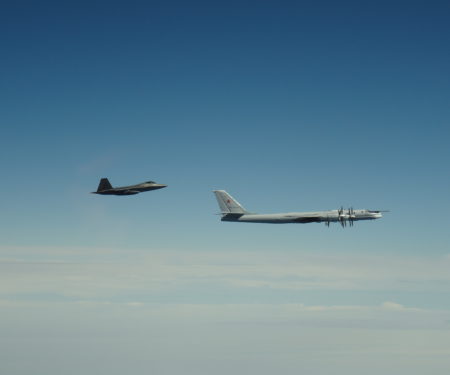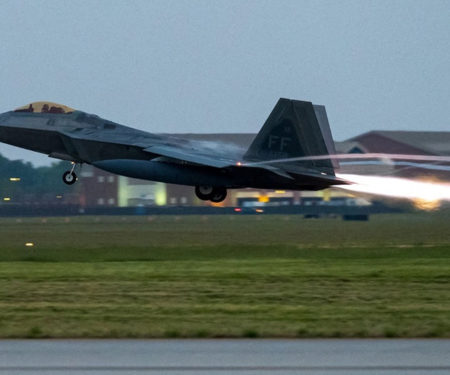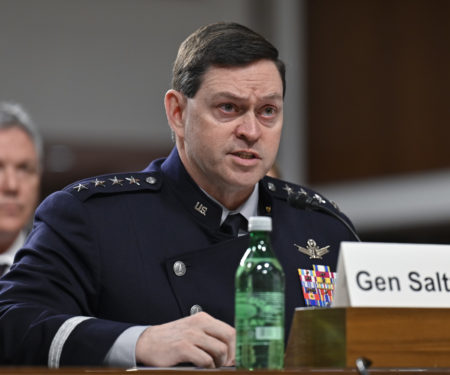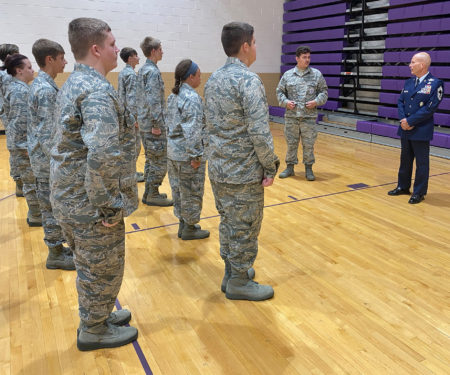Radar Sweep
Many Believe It’s Time for an Independent Uniformed Cyber Service. Here’s What It Could Look Like
While the idea has been kicked around for more than a decade, discussions for an independent cyber service—akin to the Army, Navy, Marine Corps, Air Force and Space Force — have intensified in the last few months. Lawmakers have taken time during congressional hearings to ask top Department of Defense cyber officials about the prospect of a cyber force and, increasingly, there are more questions from attendees at conferences for military officials.
Biden Administration May Halt Plans to Move Space Command to Alabama over State's Abortion Law, Officials Say
Some defense and congressional officials believe the White House is laying the groundwork to halt plans to move U.S. Space Command’s headquarters to Alabama in part because of concerns about the state’s restrictive abortion law, according to two U.S. officials and one U.S. defense official familiar with the discussions.
Cleanup of ‘Forever Chemicals’ Around Military Bases Is Woefully Underfunded, Group Says
The Pentagon has estimated that the cleanup costs for PFAS chemicals on active and former military bases, as well as in local communities, could exceed $31 billion, yet the Defense Department's budget for the job is falling behind, according to an advocacy group pressing for broader funding. The Washington, D.C.-based Environmental Working Group issued a report charging that, although the costs for cleaning up what are known as "forever chemicals" are soaring, the Pentagon consistently has requested just a fraction of the amount needed to remove these contaminants from the ground and groundwater at hundreds of sites.
Rules for Pentagon Use of Proxy Forces Shed Light on a Shadowy War Power
U.S. Special Operations forces are not required to vet for past human rights violations by the foreign troops they arm and train as surrogates, newly disclosed documents show. While the gap in rules governing vetting for a counterterrorism program have previously been reported based on anonymous sources, the documents provide official confirmation. Under the program, American commandos pay, train, and equip foreign partner forces and then dispatch them on kill-or-capture operations.
Hypersonics, Nukes Top House Lawmaker’s Priorities List
Hypersonic missiles and nuclear weapons will get top priority when the House Armed Services committee’s strategic forces panel finally gets to mark up the 2024 defense-policy bill, according to the subcommittee’s chairman. HASC markups are on hold while GOP lawmakers seek federal budget cuts by threatening to force the U.S. renege on its debts. Rep. Doug Lamborn, a Republican whose district is based in Colorado Springs, said his biggest concern ahead of the markup, which was supposed to kick off on May 11, is the top-line number.
Zelenskyy’s EuroTrip: German Billions, UK Weapons, But No Jets Coming
With Ukraine’s counteroffensive against Russia fast approaching, President Volodymyr Zelenskyy has been on a diplomatic tour of Europe that has led to a new wave of British, French, and German weapons heading to Kyiv, including tanks, air defense systems, and hundreds of drones and missiles. And yet, while the arms packages will be welcomed—especially $3 billion in arms from Germany, the largest contribution from the European power to date—Zelenskyy’s dream of a new fleet of fighter jets remains a politically sensitive subject without any public movement.
Gen. Milley Hosts Mike Bloomberg to Advise Military Bosses on Innovation Challenges
Senior U.S. military leaders spotlighted the services’ unique near- and long-term technology needs—and the combatant commands’ competing urge to accelerate such deployments—during a meeting with Defense Innovation Board Chair Mike Bloomberg earlier this month that Gen. Mark Milley hosted at the Pentagon. The engagement marked the first of two this year that Milley, the chairman of the Joint Chiefs of Staff, will steer as part of his organization’s semi-annual Strategic Seminar Series.
Go Deeper on Operational Imperatives
Air Force Secretary Frank Kendall has defined seven Operational Imperatives for the Department of the Air Force to work on, warning that “if we don't get them right, we will have unacceptable operational risk.” From a resilient space order of battle to the development of next-generation tactical air dominance and global strike platforms, these imperatives will define the Air Force for decades to come—Dive deeper into each one with our new “Operational Imperatives” pages highlighting all the latest news and developments on these critical efforts.
Britain to Train Ukrainian Pilots, Supply More Missiles and Drones
Britain is to start elementary flight training for Ukrainian pilots as part of a new military support package announced by Prime Minister Rishi Sunak during a face-to-face meeting in the U.K. with President Volodymyr Zelenskyy on May 15. Sunak linked the training program to efforts by the U.K. and others to equip the Ukrainian Air Force with Lockheed Martin-made F-16 aircraft, which he called “Ukraine’s fighter jets of choice.”
Space Force General: ‘No Pushback’ from Congress on 2024 Budget Priorities
The U.S. Space Force sees growing support from Congress for its plans to build large constellations in low Earth orbit and other priorities the service laid out in its 2024 budget request, the vice chief of space operations said May 15. “We just finished defending our budget on the Hill and it’s been well received,” Gen. David Thompson said at an industry event organized by the Space Force Association.
Inside the Elite Air Force Thunderbirds Unit
The Thunderbirds are the Air Force’s premier demonstration team, performing in dozens of air shows around the country every year. This year marks the team’s 70th anniversary – it was established in 1953, six years after the Air Force split from the Army and became its own service. The intent, according to the team’s current commander and Thunderbird #1 Lt. Col. Justin Elliott—known to his teammates simply as “one” or “boss”—was to “connect the American population to its military at a time when institutional trust was challenged.” It’s a challenge the Air Force, and military as a whole, is facing again.



